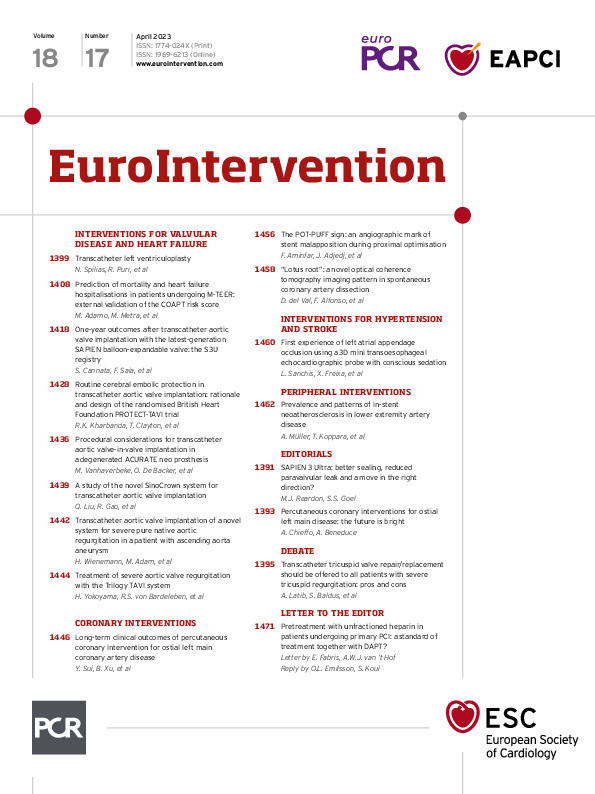We read with interest the recent study by Emilsson et al1 reporting the clinical effects of pretreatment with unfractionated heparin (UFH) prior to arrival at the coronary catheterisation laboratory (cath lab) in patients undergoing primary percutaneous coronary intervention (pPCI). The authors are to be commended for this large registry study including 41,631 patients from the Swedish Coronary Angiography and Angioplasty Registry (SCAAR). The study showed that pretreatment with UFH, compared with no pretreatment, was associated with a reduction in coronary artery occlusion (11% relative risk reduction) without increasing the risk of major in-hospital bleeding.
This study supports the early use of heparin in patients undergoing pPCI and corroborates, on a large scale, some previous results23. Indeed, in the contemporary era of ST-elevation myocardial infarction (STEMI) treatment, the prehospital (pre-H) use of heparin was an independent predictor of early myocardial reperfusion expressed as complete ST resolution during patient transportation for pPCI2. These results highlight the importance of in-ambulance treatment and the opportunity to improve early perfusion with the implementation of regional protocols which allow the initiation of antithrombotic treatment at first medical contact4.
While the effect of early administration of UFH on coronary occlusions was independent of the administration of other antithrombotic therapies prior to PCI, as an adjunctive exploratory subgroup analysis, it would have been interesting to test the potential interaction between early UFH administration and concomitant pretreatment with dual antiplatelet therapy (DAPT, i.e., aspirin plus a P2Y12 inhibitor), which is now a standard of care of many European emergency services.
Of note, among STEMI patients enrolled in the SCAAR between 2005 and 2016, almost all patients (90%) were pretreated with an antiplatelet agent. Considering that 86% had pretreatment with aspirin and 79% with a P2Y12 inhibitor, at least 65% of the patients had pretreatment with DAPT. Conversely, only 38% of patients received pretreatment with UFH. The reasons for this lower percentage of pretreatment with UFH, with respect to pretreatment with DAPT, are uncertain. Guidelines give a class I recommendation both for the use of DAPT and an anticoagulant as an early periprocedural antithrombotic medication in STEMI patients undergoing pPCI, but the level of evidence is different for the two treatments (A for DAPT and C for anticoagulation). However, the potential benefit of pre-H UFH administration should not be denied, especially considering the absence of evident safety concerns regarding the risk of major bleeding. The early period after symptom onset, when thrombus is maximal and potentially more susceptible to pharmacological therapy, represents a golden opportunity for administering antithrombotic therapy. Exploring whether pretreatment with UFH would be more effective in patients with a shorter “patient delay” (time from symptom onset to medical contact) could support this concept.
International collaborative research efforts are warranted to improve pre-H management of patients presenting with STEMI and pre-H treatment should be considered as a standard feature of STEMI patients undergoing pPCI. It is from this perspective that new parenteral antithrombotic drugs are under investigation (ClinicalTrials.gov: NCT04825743) as candidates for first point-of-contact therapy in STEMI5 and may offer a new opportunity to rapidly achieve patency of the infarct-related vessel prior to pPCI.
Conflict of interest statement
A.W.J. van ‘t Hof reports institutional unrestricted grants from Medtronic, Boehringer Ingelheim, AstraZeneca and Abbott. The other author has no conflicts of interest to declare.

